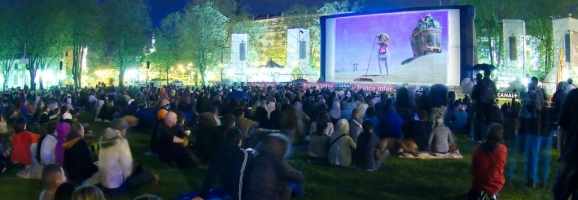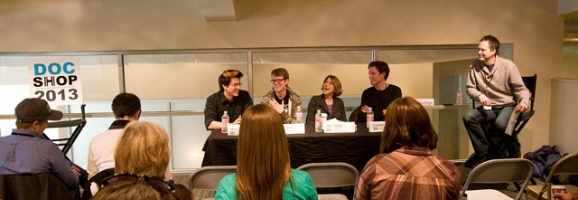Film Festivals: How To Go Like a Pro

Summer is when the film festival season kicks into high gear. With nearly every small town hosting a festival these days, chances are there is one near you. Whether you are a filmmaker looking to promote your latest project, or just looking for an excuse to get inside an air-conditioned theater, attending a festival is a great way to see new, independent work out of the mainstream. It is also a curated selection, which means someone has specifically chosen each film for you to watch. Perhaps most importantly, you will see these rare gems in the best possible light – on the BIG screen with an enthusiastic audience!
I have attended a lot of festivals, both as a filmmaker and as a film fan. I’m heading out the door to three different festivals in this month, so I thought I would pass along some of my personal tips to help you make the most of your film festival experience.
Be part of the in-crowd
Of course you don’t have to have a film in the festival to enjoy it, but if you do, it is thrilling! Seeing your work in a theater with an audience of strangers is a lot different than you and your mom crouching over the laptop. People come to festivals to meet filmmakers, so you are the star! You’ll probably get to talk about your film in a Q&A session or press conference, you’ll get invited to parties and meet many other filmmakers that might lead to future collaborations or jobs. Many festivals in Europe and Asia offer accommodation and some travel funds if your film is in competition, plus they organize events to show off their local treasures. Aspen ShortsFest organized a day of skiing, Tricky Women Animation Festival took us on a Great Women of Vienna walking tour. And there’s the swag. Festival sponsors like to give gifts to filmmakers and some of them can be quite unusual. I have received a box of Annie’s Mac n’ Cheese, an organic straw hat, books by local authors, boutique chocolate bonbons and free lattes and drinks at the local hot spots.
So, if you have made a film, don’t be shy. Go ahead and submit. Look for festivals within driving distance or somewhere you would like to travel. But be strategic, it’s a very competitive world out there. Here are some great tips to increase your chances of being selected.
Book it early
If you are travelling to a festival, know that lodging will fill up quickly. When looking for a place to stay, pay particular attention to the locations of the theaters and events. Screenings run late and parties are a must for networking and socializing so the last thing you want to do is try to find your car or public transport in the wee hours of the morning. Paying a bit more to be close to the action is absolutely worth it.
Most festivals offer discounted rates at sponsored hotels, which are listed on the festival website. I frequently go solo and on a budget, so I’ve learned to that the festival guest coordinators are a great resource. Send them an email and see if there are any other attendees who might want to split a hotel room. I’ll be sharing a room with an Australia filmmaker at the Palm Springs ShortFest this June and I can already tell from our email correspondence that she will be a fun person to hang out with. For budget travelers, hostels are another great way to meet like-minded festival goers. Or you can go to a festival where you have friends or family with a spare bed. They will appreciate seeing you and in return you can bring them to a screening as a thank you.
Buy the pass
Individual tickets to screenings are always available to the public, but if you want to get the most cinematic bang for your buck, a festival pass is the way to go. A pass will give you the flexibility to go to any screening at any time and usually will include the opening and closing ceremonies and some parties. If you have a film in the festival, you should get a free pass (if they don’t offer you one, you might think twice about going – chances are the hospitality will be lacking in other areas as well). To get a pass at the large A-list festivals like Cannes and Sundance you will have to apply for professional accreditation (translation – you need to prove you work in the film industry). A credit on IMDB or published film criticism are two of many ways to get your accreditation.
These big festivals also have several things going on at once. The Annecy International Animation Festival has film screenings all day, but they also have a film market (for distributors looking to buy films, studios recruiting new animators, producers looking for new projects etc.) and an academic conference (everything you never wanted to know about animation). Each of these events has a separate pass or you can get a pass that lets you into all of them. Think about what you want to get out of the festival and choose the pass that suits you best.
Settle in and enjoy!

Be ready to watch lots of films! Check the schedule online before the festival starts and read some reviews so you have an idea which films you want to see. It’s almost a given that you can’t see everything so think about your priorities. Do you want to watch features or shorts? Will some films be available in mainstream theaters in the future? Sometimes screenings are organized around themes so if you know you love animation, but don’t handle horror well, you can you can rule out the Late Night BloodFest program in favor of Animated Dreams.
I usually check out the online schedule a week before the festival and research some of the films and directors that will be there. Spending a bit of time at the beginning organizing your thoughts can save you that frantic overwhelmed feeling when you are on the ground. Of course, you can always change your mind about what to attend when you hear the buzz from the other people at the festival. Flexibility is the key!
You also may not like everything you see, and that is part of the fun! Festivals are competitions, frequently with a People’s Choice Award. That means you are the judge. Talk about your opinions with those around you and prepare to be challenged by unusual approaches to narrative or visual innovation. The person sitting next to you may have loved that abstract, seizure-inducing film that you couldn’t stand. Perhaps you can find the director after the screening and ask her exactly what was going on inside her head when she made that film.
Go ready to learn
Panels and workshops are one of the things that make film festivals special. Festival programmers work hard to get some big names to share the knowledge they have acquired throughout their careers. Here is where you can pick up tips and production stories from the people who make the films. One of the more interesting panels I attended at the Big Sky Documentary Film Festival was a pitch session. Director’s and producers pitched their works-in-progress to a panel of documentary programmers from POV, Independent Lens and ITVS. The best part was hearing the feedback the panel gave to each person, both abut their project and they way they pitched it. Even though I wasn’t pitching myself, I learned so much about how the distribution markets work for documentary.

Be social
With such a high concentration of film buffs in one place, you are bound to find some kindred spirits. Before I head to a festival, I make a twitter list of all the people who will be there (they are easy to find, just search the festival name and see who is tweeting about it). That way I can connect with them beforehand, and when we run into each other at the festival I feel like I already have a friend.
Most importantly, talk to people! Chat in the ticket line, say “Hi”to the person sitting next to you, mingle at the parties. This is actually the hardest thing for me, since I’m not an outgoing person. The best networking advice I ever received is to be interested in other people. People love to talk about themselves and their work so go prepared with some general questions that can break the ice. Ask them what films they have seen so far and what they enjoyed. If they are a nice person, they will return the favor and you will get talk about your work. Then you both leave thinking “Thank goodness I met someone I could talk to!”
Bring your calling card
If you are working on a project or if you have a film in the festival, bring some DVDs to give away or trade. Most filmmakers are willing to trade a film for a film – it’s a great way to get some hard-to-find films in your personal library. Don’t feel like you need a fancy professionally mastered DVD either. A DVD in a paper envelope is super easy to slip into a purse or a swag bag and that way you can carry more of them. Bring lots of business cards and don’t be afraid to make the first move when a conversation is wrapping up by offering your card. At the end of each day, take the cards you collected and write a little note on the back about your conversation and where you met them. Ideally you’ll want to send a follow-up email to each person you met a few days after the festival, but sometimes those cards slip into the black hole at the bottom of your purse and resurface a month later. So it’s nice to have a note to jog your memory. Postcards are also a great thing to hand out and most festivals have a promotional table where filmmakers can put their materials. If there’s a film you want to remember, look for the postcard and take one home for future reference.

As a final word, the big, famous festivals (Sundance, SXSW, Cannes etc.) are certainly amazing experiences, but don’t discount the small local festivals in your backyard. They are intimate, hospitable and it’s much easier to connect with people. So grab a few friends and start with a festival close to home. You won’t be disappointed!
Have a tip of your own or a favorite film festival you’ve been to?
What do you think? Leave a comment.











Very nice writeup and thank you for making a note about the local film festivals which I value most. One that I attend is a yearly very small FF in the UK that takes place in pretty much a basement. Well not really but it looks like it.
Somehow the people arranging it know how to find the good titles to screen. World cinema at its best my friends…
The smaller ones really are my favorite because they are usually run by people with passion for great films!
I’ve been wanting to go to the Sacramento film festival, which is extremely close to me, but I always forget about it when it starts up. It’s in late April, at least I think it is. Great article.
I’ve always wanted to go to a film festival, as a filmmaker and as a film-lover. I’ll keep an eye out for some local festivals here in England and will have this article close at hand for when they come around!
Great work!
A really interesting article; as a film studies student, I always feel like I should attend a festival or two (and maybe take my chances at learning everything you don’t want to know about animation), but I never know where to start.
Thanks for the tips!
My first experience with film festivals, I bought a 50-film pass to the local major film festival and spent the next ten days doing little other than watching great cinema and sleeping. The next year, when I told the staff of my exploits the previous year, I ended up with an internship and am now privileged to have experienced all three aspects of a festival – as filmmaker, as audience and behind-the-scenes.
I also think film festivals have a much more important role now with cinemas often neglecting to show some of the more obscure content, and they can be the only place to find a good arthouse or foreign-language film in my area, which is filled with multiplexes.
A good read, thankyou.
Sleep is certainly a rare commodity at a film festival. You have great perspective. Filmmakers often don’t give the festival staff and volunteers enough credit for the work they put into a successful festival.
This is great–thank you for this. I think most of my film friends don’t go to festivals because they are not Sundance or Cannes but I’m glad you see the value in local festivals. I think people are often surprised at the quality on display. It really is a great way to keep up with cinema culture and to get a sense of the kind of work being done when money or studio pressure doesn’t get in the way.
There are precious few festivals of any size in my part of the world. After this article, I want to try to search some out though. Now if the midwest would have some larger ones…!
A lot of places use festivals to draw people there. The big cities are always a good bet. Tourist towns tend to schedule them in the off season, which can be a really great way to beat the crowds and go to a beautiful place. Not sure where exactly you live, but I bet there is a festival within driving distance.
Very helpful. This may very well come in handy for me.
I loved the article. It is so true about the smaller film festivals – the people running them are truly passionate about films.
Volunteering was the way I got my first film festival experience. It was a great way to get around that obstacle of not having any money in college.
Volunteering is great! That’s how I got hooked on festivals. I volunteered at the Ottawa Animation Festival as a student and it was a great chance to meet some of my heroes!
Loved the article! I’m currently interning at the New York International Children’s Film Festival and a lot of the stuff you said about festival programming is very accurate. (We do work hard to seek big names to show up at our festivals!) Film festivals are surely a fantastic way to take a break from money-infested blockbusters and watch some original, often intellectually-stimulating works by underdog filmmakers from all over the place.
Yeah. The best way I’ve found to be involved in film festivals is interning. TIE international has some of the best experimental cinema fests and internships.
Great advice! I would only add that interning or volunteering can be a great way of getting involved first-hand, especially in terms of the larger festivals (ex. Sundance) where getting accreditation can be tricky or expensive otherwise! Some festivals also offer student deals/passes for film students so that’s another thing to keep in mind. Loved the external links you provided as well, very helpful!
Yes. I was just at Annecy and student volunteers were pretty much running the show. Most of them were studying at animation schools in France and having the time of their lives.